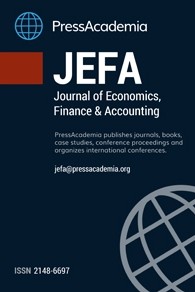SHORT-TERM PRICE-PERFORMANCE ANALYSIS OF INITIAL PUBLIC OFFERINGS: AN APPLICATION ON HEALTH INDUSTRY IN NYSE
Purpose - The purpose of this study is to investigate short-term underpricing anomaly of IPOs in health industry firms in USA. This study tried to test short-term underpricing anomaly that suggests investors may able to get abnormal returns by purchasing stocks at issuance date and selling them after holding for short time period.
Methodology – Analysis period is taken into consideration as first 7 days after the issuance. To conduct analysis in the study, a sample, which includes 12 listed firms, is built. Stock returns are calculated from issuance date until 7th day. First raw returns are calculated based on price movements of each IPO and then abnormal returns are calculated by comparing them to NYSE index return. In order to get smoother series to reflect normal distribution features, compound abnormal returns are calculated.
Findings – Raw returns are positive but significant only on 5th day after issuance. Abnormal returns except for 2nd and 3rd day are positive but statistically significant only 5th day after issuance. Compound abnormal returns are positive except for 3rd day but similarly it is statistically significant on 5th day after issuance. Based on test results, an investor who purchased stocks at the issuance and hold them until 5th day would get higher return (abnormal return) by %0,71 and higher compound return (compound abnormal return) by %1,23 than market average.
Conclusion – According to results of t-test, it can claimed that underpricing anomaly can be confirmed for the firms are traded in health industry in NYSE.
___
- Asquith, P., & Mullins, D. W. (1986). Equity Issues And Offering Dilution. Journal of Financial Economics, (15), 61 - 89.
- Bajo, E., Raimondo, C. (2017). Media Sentiment and IPO Underpricing, Journal of Corporate Finance, 46, 139-153.
- Boulton, T.J., Smart, S.B., Zutter, C. (2017). Conservatism and International IPO Underpricing, Journal of International Business Studies, 48(6), 763-785.
- Cikrikci, M, Ozyesil, M . (2018). Long Term Underperformance Anomaly and Its Dterminant Factors on Seasoned Equity Offerings: Evidence From Turkey. Journal of Business Economics And Finance, 7 (3), 208-227.
- Gandolfi, G., Regalli, M., Soana, M.G, Arcuri, M.C. (2018). Underpricing and Long-Term Performance of IPOS: Evidence from European Intermediary Oriented Markets, Economic, Management and Financial Markets, 3,11-36.
- Kotlar, J., Signori, A., Massis A.D., Vismara, S. (2018), Financial Wealth, Socioemotional Wealth, and IPO Underpricing in Family Frims: A Two – Stage Gamble Model, Academy of Management Journal, 61(3), 1-59.
- Logue, D.E. (1973). On The Pricing of Unseasoned Equity Issues: 1965-1969. Journal of Financial and Quantitative Analysis, 8 (1). 91 - 103.
- Loughran, T., Ritter, J. R., Rydqvist, K. (2015). Initial Public Offerings: International Insights. Pacific - Basin Finance Journal, (2). 165 - 199.
- Mcdonald, J, Fisher, A.K. (1972). New Issue Stock Price Behaviour. Journal of Finance, 27 (1). 97 - 102.
- Myers, S. C., & Majluf, N. S. (1984). Corporate Financing and Investment Decisions When Firms Have Information The Investors Do Not Have. Journal of Financial Ecconomics, 13 (2). 187 – 221.
- Ritter, J. R. (1984). The Hot Issue Market of 1980. Journal of Business, 57 (2). 15 - 240
- Ritter, J. R. (1991) The Long - Run Performance of Initial Public Offerings. Journal of Finance, 46 (1), 3 - 27.
- Rock, K. (1986). Why New Issues Are Underpriced. Journal of Financial Economics, (15). 187 - 212.
- Tarı, R., (2012). Ekonometri. Kocaeli: Umuttepe Yayınları.
- Welch, I. (1989). Seasoned Equity Offerings, Imitation Costs and The Underpicing of Initial Public Offerings. The Journal of Finance, 44 (2), 421 - 449.
- Welch, I. (1992). Sequential Sales, Learning, and Cascades. The Journal of Finance, 47 ( 2). 695 – 732.
- Wu, C., & Kwork, C. C. K. (2007). Long-Run Performance of Global Versus Domestic Initial Public Offerings. Journal of Banking & Finance, (31). 609 -627
- Yayın Aralığı: Yılda 4 Sayı
- Başlangıç: 2014
- Yayıncı: PressAcademia
